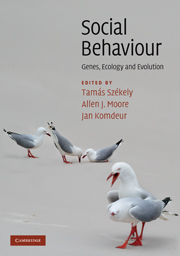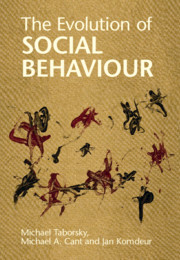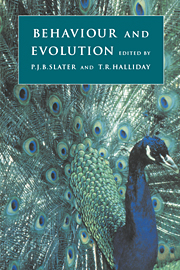Social Behaviour
Genes, Ecology and Evolution
$67.99 (P)
- Editors:
- Tamás Székely, University of Bath
- Allen J. Moore, University of Exeter
- Jan Komdeur, Rijksuniversiteit Groningen, The Netherlands
- Date Published: December 2010
- availability: Available
- format: Paperback
- isbn: 9780521709620
$
67.99
(P)
Paperback
-
Humans live in large and extensive societies and spend much of their time interacting socially. Likewise, most other animals also interact socially. Social behaviour is of constant fascination to biologists and psychologists of many disciplines, from behavioural ecology to comparative biology and sociobiology. The two major approaches used to study social behaviour involve either the mechanism of behaviour - where it has come from and how it has evolved, or the function of the behaviour studied. With guest articles from leaders in the field, theoretical foundations along with recent advances are presented to give a truly multidisciplinary overview of social behaviour, for advanced undergraduate and graduate students. Topics include aggression, communication, group living, sexual behaviour and co-operative breeding. With examples ranging from bacteria to social mammals and humans, a variety of research tools are used, including candidate gene approaches, quantitative genetics, neuro-endocrine studies, cost-benefit and phylogenetic analyses and evolutionary game theory.
Read more- Proposes a novel way of looking at social traits using a systems biology approach, encouraging new studies using this new approach
- Covers a broad range of taxa, from bacteria to humans. Will appeal to readers from a wide range of disciplines
- Gives personalised accounts from noted authorities of why social behaviour is interesting. Appealing to those interested in the development and history of the field
Reviews & endorsements
"Szekely, Komdeur and Moore have assembled a hugely successful edited collection on the biology of social behavior. The coverage is up-to-date and complete, dealing with the full range of proximate and ultimate causes of social behavior as well as a broad range of social organisms from bacteria to humans. The chapter authors are leaders in their fields. Interspersed among the sophisticated but accessible review chapters are short, lively essays written by prominent sociobiologists. An indispensable book for all behavioral biologists and their students."
John Alcock, Arizona State UniversitySee more reviews"Social Behaviour: Genes, Ecology and Evolution provides the first extensive synthesis of research on animal social behaviour since the publication of E O Wilson's Sociobiology in 1974. The book brings together important reviews of the ecology, genetics and evolution of social behaviour by over sixty research leaders in this field to describe the past accomplishments of the field, outline current problems and suggest future objectives. It will be necessary reading for anyone involved in research in this area."
Tim Clutton-Brock, University of Cambridge"This is an excellent book, that I thoroughly recommend! Social Behaviour shows that not only does everybody have a social life, but that it is the social aspects of life that are the most interesting. Sociality spices things up, leading to conflicts, but also the chance for cooperation. Whilst this has led to cool natural history, it also results in questions that cut to the core of how natural selection works. In Social Behaviour, some of the world’s leading researchers do an excellent job of synthesising the huge progress that has been made over especially the last 50 years. The remit is broad, moving from the fruiting bodies of slime moulds to wealth inheritance in humans, but this done almost seamlessly, demonstrating the power of evolutionary theory. By showing the excitement of the field, the great success stories, and the outstanding mysteries, this book is sure to stimulate the next generation of researchers and refresh the older generation."
Stuart West, University of Oxford"The editors have managed to bring together a true all-star team of scientists, and the volume demonstrates the key difference between an all-star Hollywood movie and an all-star scientific book: only the latter will improve the quality of the script."
Redouan Bshary, The Quarterly Review of BiologyCustomer reviews
Not yet reviewed
Be the first to review
Review was not posted due to profanity
×Product details
- Date Published: December 2010
- format: Paperback
- isbn: 9780521709620
- length: 576 pages
- dimensions: 205 x 190 x 26 mm
- weight: 1.22kg
- contains: 89 b/w illus. 13 tables
- availability: Available
Table of Contents
Introduction Tamás Székely, Allen J. Moore and Jan Komdeur
Part I. Foundations:
1. Nature-nurture interactions Marla B. Sokolowski and Joel D. Levine
2. The quantitative genetics of social behaviour Bronwyn H. Bleakley, Jason B. Wolf and Allen J. Moore
3. Social behaviour and bird-song from a neural and endocrine perspective Elizabeth Adkins-Regan, Timothy J. DeVoogd and Jordan M. Moore
4. Evolutionary game theory John M. McNamara and Franz J. Weissing
5. Recent advances in comparative methods Robert P. Freckleton and Mark Pagel
6. Social evolution theory: a review of methods and approaches Tom Wenseleers, Andy Gardner and Kevin R. Foster
Part II. Themes:
7. Aggression: towards an integration of gene, brain and behaviour Robert Huber and Edward A. Kravitz
8. Social influences on communication signals: from honesty to exploitation Mark E. Hauber and Marlene Zuk
9. Important topics in group living Jens Krause and Graeme Ruxton
10. Sexual behaviour: conflict, cooperation and co-evolution Tomasso Pizzari and Russell Bonduriansky
11. Pair bonds and parental behaviour Lisa McGraw, Tamás Székely and Larry J. Young
12. Adaptations and constraints in the evolution of delayed dispersal: implications for cooperation Jan Komdeur and Jan Ekman
13. Social behaviour in microorganisms Kevin R. Foster
14. Social environments, social tactics and their fitness consequences in complex mammalian societies Marion L. East and Heribert Hofer
15. Social behaviour in humans Ruth Mace
Part III. Implications:
16. Personality and individual social specialisation Denis Réale and Niels J. Dingemanse
17. Molecular and genetic influences on the neural substrate of social cognition in humans Louise Gallagher and David Skuse
18. Population density, social behaviour and sex allocation Suzanne H. Alonzo and Ben C. Sheldon
19. Social behaviour and speciation Gerald S. Wilkinson and Leanna M. Birge
20. Social behaviour in conservation Daniel T. Blumstein
21. Prospects for research in social behaviour: systems biology meets behaviour Allen J. Moore, Tamás Székely and Jan Komdeur
Part IV. Profiles:
22. Undiminished passion Tim Birkhead
23. Social evolution, sexual intrigue and serendipity Andrew Cockburn
24. Mating systems: integrating sexual conflict and ecology Nicholas B. Davies
25. In love with Ropalidia marginata – for 34 years, and still going strong Raghavendra Gadagkar
26. The Huddler's Dilemma: a cold shoulder or a warm inner glow David Haig
27. Multi-component signals in ant communication Bert Hölldobler
28. What's wrong with this picture? Sarah B. Hrdy
29. From behavioural observations, to genes, to evolution Laurent Keller
30. Reputation can make the world go round – or why we are sometimes social Manfred Milinski
31. A haphazard career Ronald Noë
32. In celebration of questions, past, present and future Geoff A. Parker
33. Mating systems and genetic variation Marion Petrie
34. Selections from a life in social selection David C. Queller
35. The de novo evolution of cooperation: an unlikely event Paul B. Rainey
36. Evolutionary genetics and social behaviour Mike Ritchie
37. Genes and social behaviour: from gene to genome to 1000 animal genomes Gene E. Robinson
38. Behavioural ecology, why do I love thee? Let me count the ways Paul W. Sherman
39. Anonymous (and other) social experience and the evolution of cooperation by reciprocity Michael Taborsky
40. Social theory based on natural selection Robert Trivers
41. Look to the ants Edward O. Wilson
42. The handicap principle and social behaviour Amotz Zahavi .Instructors have used or reviewed this title for the following courses
- Evolution and Behavior
- Genes, Brains, and Behavior
- Social Evolution
Sorry, this resource is locked
Please register or sign in to request access. If you are having problems accessing these resources please email [email protected]
Register Sign in» Proceed
You are now leaving the Cambridge University Press website. Your eBook purchase and download will be completed by our partner www.ebooks.com. Please see the permission section of the www.ebooks.com catalogue page for details of the print & copy limits on our eBooks.
Continue ×Are you sure you want to delete your account?
This cannot be undone.
Thank you for your feedback which will help us improve our service.
If you requested a response, we will make sure to get back to you shortly.
×







